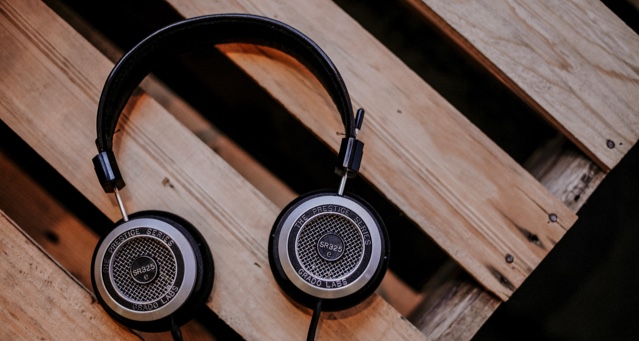I fell in love with audiobooks when I took my first full-time job. I had a near hour-long commute each way to the library where I worked as a teen and adult librarian, and it was an easy way for me to keep up with reads. I used the audio format specifically to listen to books I might not otherwise read in print because they weren’t genres I gravitated toward. I listened my way through a number of Morris Award finalists, as well as audiobooks like MT Anderson’s Feed, which is forever my go-to recommendation for an immersive audiobook experience.
My job at this library focused on teen collection development, so it felt crucial to stay abreast there. But I quickly found myself also using the audiobook time to listen to some of the nonfiction for adults that my eyes could not consume quickly enough. Eric Weiner’s The Geography of Happiness cracked open the possibility of nonfiction on audio for me.

I left that job after a year and took a new library job in the town where I lived, cutting my two hour car time into roughly 5 minutes each way. I lost audiobooks along the way, as I could never quite figure out how to weave them back into my life.
My third library job involved another commute, but I couldn’t concentrate enough on the drive to pick up audiobooks again. This was a dark period in my life. My depression and anxiety were at their peak, and while I could blow through print books, listening required a level of attention and mental focus I could not give. It wasn’t until years after, when I got help and found the tools to manage my mental health, that audiobooks reentered my life.
The irony of it, though, was audiobooks came back into my life when I no longer had a commute. I work full-time from home, but in the midst of moving from eight years in one home in one state to a new home in a new state, I downloaded an audiobook. I’d wanted to catch up on some new nonfiction I couldn’t keep up with in print.
Now, two years later, audiobooks are a staple in my every day life.
I may no longer have the work commute, but I sneak in listening every chance I can. Sometimes, it’s in 20 minute snatches while showering or getting ready for the day. Sometimes, I’ll walk to yoga or go for a walk because it’s nice outside, grabbing onto those 20 or 30 minutes to listen. Other times, it’s trips to the store or to my volunteer gig that’s a 30 minute drive. It’s also mopping or dishes or laundry that give me a dedicated time to listen.
Every one of those chunks of time adds up, and my nonfiction reading has absolutely soared.
And I’ve discovered that I can’t listen to fiction on audio anymore. My brain can’t focus enough on the story lines in such small snatches of time. Where the commute allowed immersion, the short bursts of time better allow in the kinds of books that allow dipping in and out.
 I find myself asking people who read nonfiction to tell me whether or not they think a book would be good on audio. I’m not super picky about the narrator (though I do have favorites). I’m more concerned about whether the book is one that doesn’t need my full attention start to finish. So when I asked about whether or not listening to Mira Jacob’s Good Talk: A Memoir in Conversations would be a solid choice, I was surprised to discover that the book’s format never came into play.
I find myself asking people who read nonfiction to tell me whether or not they think a book would be good on audio. I’m not super picky about the narrator (though I do have favorites). I’m more concerned about whether the book is one that doesn’t need my full attention start to finish. So when I asked about whether or not listening to Mira Jacob’s Good Talk: A Memoir in Conversations would be a solid choice, I was surprised to discover that the book’s format never came into play.
Memoirs tend to be solid picks on audio for me and what I gravitate toward. The description of Jacob’s memoir captured me immediately: it’s a story of a conversation that started between her biracial son and her after he asks why it is people fear those with brown skin. What starts as something innocuous, a question of sheer curiosity from a young child, turns into something much deeper, steeped in contemporary and historical beliefs about race and immigration, layered upon the realities of a post–2016 election world.
By turns serious and humorous, the audiobook for Jacobs blew me away as I listened. It’s full cast, with a rich array of voices for everyone. Given that the book itself is a series of conversations, the full cast performance takes advantage of the style. The flow of the book itself is nonlinear and utilizing numerous performers allowed this style to move seamlessly. I was never lost or questioning where I was in time or history.
Good Talk was being a fly on the wall at a family dinner or at the table next to another one, where all you want to do is better understand their stories and experiences. Where you see how each person’s history relates to the other. In addition to the story itself being a conversation between Mira and her son, it’s a story about how we’re all part of a larger conversation. Even if we don’t have lines in them—or we’re not voicing them—listening in and absorbing the discussion matters just as much (if not, in many cases, more).
It wasn’t until I finished the book—which was only two and a half hours on audio—that I discovered why it was so short.
Good Talk is a graphic memoir.
I was surprised I never felt I missed out on anything by listening to a comic—a format that marries the visual element with text to convey the complexity and depth of story—on audio.
Perhaps it was the fact a full cast allowed the book to sound like a propulsive comic, moving smoothly from panel to panel.
Or perhaps the reality is a good story is a good story, and that translates across formats.
I’ve been chewing this over since finishing Jacob’s memoir, which quickly put itself at the top of my favorite books of the year, as well as atop the shelf of my favorite audiobooks. I found myself deeply immersed, despite the fact I could only listen in short bursts of time, much like I find myself immersed in a good comic. I can pick them up and put them down and stay connected no matter how long the space between readings.
I also find myself wanting to pick up the graphic novel and experience the story again in that format.
I’m not a rereader, and I’m not one to encourage others to reread. But this book was an outstanding audio, and it makes me want to be a rereader. More, it makes me want to dip my toes even deeper into the water of comics on audio. With more comics hitting the audio format and audiobooks becoming more accessible and more widely viewed as legitimate reading—exercising a whole host of listening and comprehension skills that were once the primary means of storytelling all together—this is an exciting time to be an audiobook reader. There is such immense opportunity for discovering new voices, for carving space in otherwise dull pockets of life to sneak in stories, and for evaluating the whole of one’s reading habits (as well as questioning them all together). Audiobooks have been inextricably linked to my job history, my mental health journey, and my adulthood more broadly, and I cannot wait to see what else they allow me to discover about myself and my life as a reader.
A good reading experience is one that transcends the format. A great reading experience is one where the format of the book transcends even the format in which it’s consumed.
By signing up you agree to our Terms of Service

